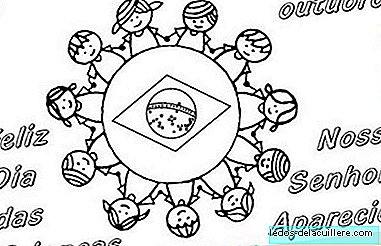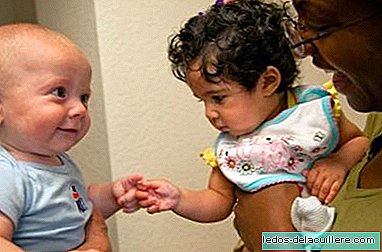
A few days ago, in order to explain a little why we should not abuse the "No" and how we can do to avoid it and get even better results, I told you why we should not say so much what they can not do and we can Tell them what they can do. It may seem odd that it works more to divert their attention than to say "No," but it is possible that they may not even understand our denial depending on the age we are talking about.
In the nine month review I ask parents if their children already understand the "No". In theory, at that age, only 50% of babies understand it, but most, if not all, tell me that "yes, you understand perfectly," to which some add a "but I don't even pay attention ". So to talk a little more about the "No" and so that we understand a little more all why they ignore us, let's see today when babies understand the "No".
What the Haizea-Llevant Table says
The Haizea-Llevant Table is a record that, based on studies conducted with babies of different ages, tells us when they start doing one thing or another and, therefore, marks us more or less when it is normal for them to do something and when It could be too late.
The table always gives us three figures, the first is when 50% of the babies studied do something concrete, the second when 75% does it and the third when 95% does it. The remaining 5% of children who do not are those who they should be valued in case it is normal for it to take time to do so or if there could be any development problem.
After nine months, as I say, parents begin to be asked if babies, when you tell them they can't do something, understand it. This is if by saying "don't put this in your mouth" or "no, no ... don't touch that", the child stops. According to the Haizea-Levant Table 50% of children understand a ban when they are 8.3 months old, he 75% he understands when they have 10.4 months and the 95% of children already understand when they have 14.8 months. That is, until 15 months you can not say that almost all children understand a ban.
But what do they really understand?
Now what do they understand? Because as many parents say, you say no, he stops for a moment, but then he laughs and continues to do so. Of course, if a father is able to understand what his son really understands, there will be no major problem in that. If instead you think you understand perfectly, it depends. I have heard parents explain it as if it were a challenge: "it challenges me, tests me and keeps doing it," parents who take action: "but I hit him in the hand and he stops doing so" and parents who take drastic measures "but I don't say anything, I let my fingers go into the plug, I already know that the differential jumps."
Of course, that's when you have to make things a bit clear, because one thing is that they know that "No" is a word that means something to avoid, a "for a moment," and another very different is that they have very clear why we say no.

Imagine that you go down the street walking quietly when someone says "No, no, no!". You stop, you look around for danger, you look behind in case you have stepped on something you shouldn't have and when you don't see anything strange you look at the person to explain it. If it is explained, you will know why I said no, but if it does not, you will look for the hidden camera, you will think that it is missing a screw and you will continue walking trying to find the explanation for what has just happened. Why are you still walking? Why don't you listen to him? Because you don't understand why they say no.
An 8-month-old child or a 15-year-old child, when they understand the word "No" most, is able to know what he wants to say something, but is not able to understand everything that comes next. Perhaps because he does not understand our explanation, perhaps because he is not yet able to reason. If he is 4 years old, you say "No, honey, you can't touch a plug or put anything in because it gives you electricity and it does a lot of damage" and every time you see one you will know that if you approach and touch it, you can give it electricity . He is able to reason, think about the consequence and avoid it. But a 15-month-old boy does not understand the message well, he is not able to memorize it and that is why we adapt it and do that of “No! Damage, pupa, alas!”, All while putting our finger on the plug and we move quickly away as if something had happened to us, making a face of fictional pain. That serves for the moment, the child to something else, butterfly, but if you leave it, in a while he will no longer remember our great performance deserving of an award and your curiosity will lead you back to touch what you can't touch. Not able to reason the message. He is not able to see beyond and understand the consequence. He is not able to create in his mind the "what will happen if I do this" scene. He just does it to see what happens.
Gradually, as things happen, as their actions have consequences, as they understand language more and internalize it, as they mature, they are better able to understand what it is to be right and to be wrong, what is the damage, the pain, where they can suffer it and where not, what are the safe places and which are not, what are the consequences of doing something and not doing it and with all this they internalize the message, ours, or the one that they create themselves (that sometimes they learn things without needing to explain anything).
If someone tells us "No, no, no!" down the street, and when we stop we see a hole in the ground that we had not seen, no more words will be needed. Or if they tell us "don't follow, they just painted and you will get stained", we will not need to approach to see if we really get stained. We understand. Well, with children it is the same. They have to be able to do that reasoning and Babies of 8 months, and those of 15, still have little ability to reason.
Then what do we do?
Well, the same thing we always do: talk and explain things, don't leave them alone because we know that even if we say no, they will try. Obviously, do not hit them, punish them or think that they are challenging us, or that they are "very bad" because they ignore us, because they are neither suitable methods for any age nor do they make any sense when that is not what is happening.
Watch them, be aware of them, accompany the "No" of a change: "you can't touch this, I take it out of your reach", "you can't touch this, we go somewhere else" and you take it to do something else, and Explain why you can't. With patience, and with time, there will come a day when you will understand why you cannot do or touch what we do not want you to touch or do.
But he gets angry, throws himself on the ground and cries ...
Well of course, that's how children are. If he wants to do one thing, you say no and he is not able to understand why not, how can he not be angry? Wouldn't you be angry if the day you were going to take a vacation at work they told you no and the reason was absurd? Because I throw myself on the ground and kick like a two-year-old boy, and then I go out into the street and stay in an angry corner, that I don't move even if my coworkers hide in the next corner to make me Believe they keep walking.
Well, they do, they don't understand it and that's why they get angry. That is why we parents have to use our most valuable weapons, dialogue, patience and warm hugs. With love, we explain why not, why it is not possible, what is the risk, the reason and we offer our arms while we suggest, as we talked the other day, what is what we can do, it sure will be as or more fun than what he wanted to do.
Photos | Thinkstock
In Babies and more | And we will not create a trauma? Children need parents, punishment is an uneducated method, a slap in time?












